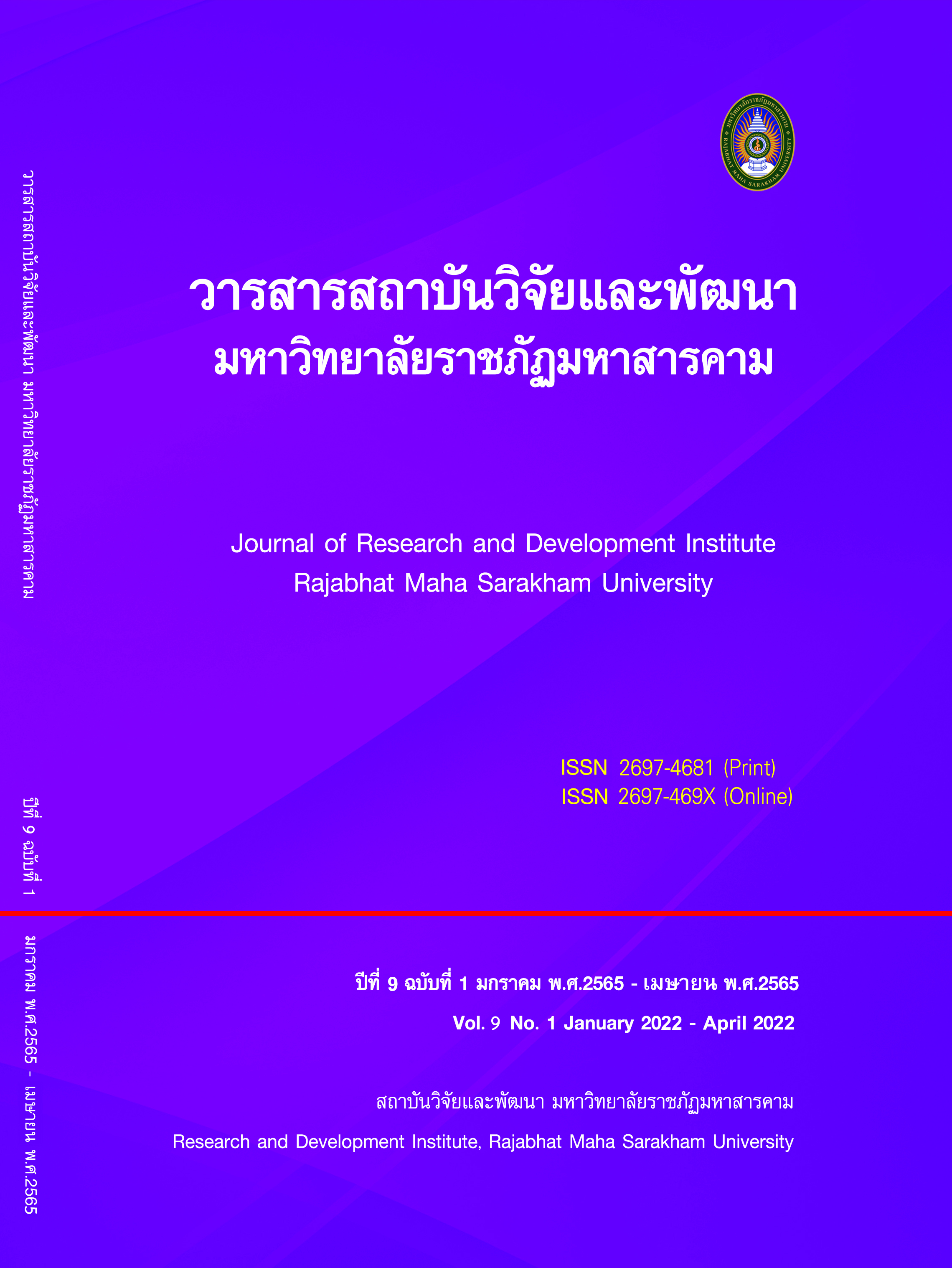A Model for Development of Elderly Persons’ Quality of Life According to Buddhism Ways
Keywords:
Model, Quality of LifeAbstract
This research aimed to; 1) Study the current state and needs of elderly persons’ quality of life according to buddhism ways in Maha Sarakham municipal area, 2) Construct a model for development the elderly persons’ quality of life according to Buddhism ways, 3) Try-out the model for development the quality of life of elderly persons. this research used a research and development (R & D) method. Research is divided into 3 phases. Phase 1 Study the current state and needs for quality of life development according to Buddhism ways. The samples were 360 elderly persons in Maha Sarakham municipal area in the year 2019 (2562). Phase 2 construct a model for development the elderly Persons’ quality of life under 9 experts supervision. Phase 3 try – out the model for elderly Persons’ quality of life. The target group consisted of 42 elderly persons living in Maha Sarakham municipal area. Tools for data collection were questionnaire, evaluation forms, interviews recard form and satisfaction questionnaire. Statistics used were mean () standard deviation (S.D.) percentage. The analysis results were shown in the form of analysis tables.
The research results were as follows: 1) The current state and needs for quality of life development of the elderly persons in Maha Sarakham municipal area were found at the current state the middle level and need the highest level respectively and the PNImodified value was between 0.27 – 0.33, with an overall value of 0.27. 2) The model for improving the quality of life for the elderly according to Buddhism consisted of 9 components as follows: (1) Essence (2) Development objectives (3) Development material (4) Development activities (5) Training materials (6) Measurement and evaluation of development results (7) Development results (8) Problems and Obstacles and (9) Suggestions, and the experts assessed the suitability at the highest level. and the possibility is at the highest level. 3) The results of the experimental model found that The satisfaction level was at the highest level. The assessment of the quality of life development model for the elderly according to Buddhism was at the highest level.
References
Boonraksa, A. (2011). Human Resource Development according to the 4th Prayer of the Provincial Headquarters, Royal Thai Army 31. Bangkok: Mahachulalongkornrajavidyalaya University.
Champawai, S. (2011). Developing a model of health promotion for the elderly with participation in the community. Maha Sarakham: Maha Sarakham University.
ChangMai, S. (2007). Thai society and the situation of the elderly at present and in the future. [Online]. http//:www.matichon.co.th [3 May 2021]
Chuanpee, S. (1997). Quality of Life Study of the Elderly, Bang Mueang Subdistrict, Samut Prakan Province. Bangkok: Srinakharinwirot University.
Jaisamran, U. (2010). Ob & dun: Update & practical IV, Bangkok: Chulalongkorn University.
Kamhom, R. (2016). Developing a social welfare system for the elderly to reduce social inequality. [Online]. http://elibrary.trf.or.th/project_contentTRFN.asp?PJID =SRI59M0403. [3 May 2021]
Ketkla, P. & Jantaraposri, W. (2012). Factors Associated with Quality of Life of the Elderly who Receive Subsistence Allowance in Panna nikhom District,Sakon nakhon Province. Journal of the Office of DPC 7 Khon Kaen, Volume 19, Issue 2 (2012): April-September.
Kittikhun, P. (2002). Study the quality of life of villagers in low-income communities Songkhla Municipality, Songkhla Province. Songkhla: Thaksin University.
Mahatnirankul, S., et al. (1997). Comparison of the World Health Organization's Quality of Life Scale, a set of 100 indicators and 26 indicators. Chiang Mai: Suanprung Hospital.
Nutsaengplee, M. (1999). Factors Affecting Satisfaction of the Elderly: A Case Study of the Elderly in Bonkai Community Bangkok. Bangkok: Thammasat University.
Phothinam, S., et al. (2007). Thai Elderly: In the context of Maha Sarakham Province. [Online]. http://www.smj.ejnal.com/e-journal/showdetail/?show_detail=T&art id=1541. [5 May 2021]
Phra Maha Phutthinan Boonruang. (2008). Developing the quality of an educational institution to be a school of learning Sustainable model according to Buddhism. Chiang Rai: Chiang Rai Rajabhat University.
Phra Phrom Khu Na Phon. (2016). Characteristics of Buddhism. Bangkok: Print Suay Co., Ltd.
Phra Tham Pi Dok (Prayut Payutto). (1997). Dharma series for young people: Buddhism and life development. Bangkok: Thammaspa.
Phrakhru SupphithanJantopas. (Wongkham, N.). (2015). Study the process of improving the quality of life of the elderly according to Buddhism. Yokkrabat Subdistrict, Sam Ngao District, Tak Province. Bangkok: Mahachulalongkornrajavidyalaya University.
Pitaktepsombat, P. (2005). Job satisfaction and organizational engagement: meaning, theory, research methods, measurements and research. Bangkok: Sematham Publishing.
Promin, T. (2002). Role of local governors in promoting people's quality of life development: a case study Phra Samut Chedi District Samut Prakan Province. Chonburi: Burapha University.
Ratanasajtam, K., et al. (1992). Developing an appropriate model in the way of planning to improve the quality of life according to basic needs at the village level. Bangkok: University Project, Nam Phrathai Project from the King for Northeastern Development.
Srisa-ard, B. (2002). Preliminary research. (7thed). Bangkok: Suwee Wiyasas.
Teerakiatkamjorn, A. (2011). Quality of life of the elderly in Suthep Subdistrict Municipality, Muang District, Chiang Mai Province. Chiang Mai: Chiang Mai University.
Thai Elderly Research and Development Institute. (2012). The situation of Thai people 2011. Bangkok: Thai Elderly Research and Development Institute.
Thai monarchy institute. (2016). Situation of the Thai Elderly 2015. Nakhon Pathom: Mahidol University.
Watee, B. (2001). Relationship between hope, stress coping behavior and quality of life of families of AIDS patients. Khon Kaen: Khon Kaen University.
WHO QOL GROUP. (1995). The World Health Organization Quality. Social Science & Medicine, 41, 1403-1410.
Wongwanit, S. (2019). Need-Based Assessment Research. (4thed). Bangkok: Chulalongkorn University.
Worakham, P. (2019). Educational Research. (11thed). Maha Sarakham: Taxila printing.
Downloads
Published
How to Cite
Issue
Section
License
Copyright (c) 2022 Journal of Research and Development Institute Rajabhat Maha Sarakham University

This work is licensed under a Creative Commons Attribution-NonCommercial-NoDerivatives 4.0 International License.
Articles that are published are copyrighted by the authors of the articles







